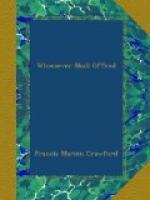“I see,” said the boy. “I wonder whether my mother would not understand that. It seems so simple!”
“She will, when the time comes, no doubt,” answered Corbario. “Your mother is a great exception, my dear boy. On the other hand, she is so anxious about your health just now, that, if I were you, I would not say anything about feeling the want of a little excitement. Of course your life is monotonous. I know it. But there is nothing more monotonous than getting well, is there? The best part of it is the looking forward to what one will do when one is quite strong. You and I can talk of that, sometimes, and build castles in the air; but it is of no use to give your mother the idea that you are beating your wings against the bars of your cage, is it?”
Folco was quite lyric that day, but the words made exactly the impression he wished.
“You are right,” Marcello said. “You always are. There is nobody like you, Folco. You are an elder brother to me, and yet you don’t preach. I often tell my mother so.”
This was true, and what Marcello told her added to her happiness, if anything could do that, and she encouraged the two to go off together as much as possible. She even suggested that they should go down to San Domenico for a fortnight, to look after the great Calabrian estate.
They rose and began to walk toward the cottage. The shooting had been good that morning, as quail-shooting goes, and the man who acted as keeper, loader, gardener, and general factotum, and who went out with any one who wanted to shoot, had gone on to the cottage with the bag, the two guns, and the animal which he called his dog. The man’s name was Ercole, that is to say, Hercules; and though he was not a giant, he certainly bore a closer resemblance to the hero than his dog did to dogs in general.
“He was born in my house,” Ercole said, when any one asked questions. “Find a better one if you can. His name? I call him Nino, short for John, because he barks so well at night. You don’t understand? It is the ‘voice of one crying in the wilderness.’ Did you never go to Sunday school? Or do you call this place a garden, a park, a public promenade? I call it a desert. There are not even cats.”
When an Italian countryman says of a place that even cats will not stay in it, he considers that he has evoked a picture of ultimate desolation that cannot be surpassed. It had always been Ercole’s dream to live in the city, though he did not look like a man naturally intended for town life. He was short and skinny, though he was as wiry as a monkey; his face was slightly pitted with the smallpox, and the malaria of many summers had left him with a complexion of the colour of cheap leather; he had eyes like a hawk, matted black hair, and jagged white teeth. He and his fustian clothes smelt of earth, burnt gunpowder, goat’s cheese, garlic, and bad tobacco. He was no great talker, but his language




